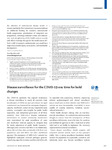Disease surveillance for the COVID-19 era: time for bold changes
Morgan, Oliver W
Aguilera, Ximena
Ammon, Andrea
Amuasi, John
Fall, Ibrahima Socé
Frieden, Tom
Heymann, David
Ihekweazu, Chikwe
Jeong, Eun-kyeong
Leung, Gabriel M
Mahon, Barbara
Nkengasong, John
Qamar, Farah Naz
Schuchat, Anne
Wieler, Lothar H
Dowell, Scott F
The COVID-19 pandemic has exposed weaknesses in disease surveillance in nearly all countries. Early identification of COVID-19 cases and clusters for rapid containment was hampered by inadequate diagnostic capacity, insufficient contact tracing, fragmented data systems, incomplete data insights for public health responders, and suboptimal governance of all these elements. Once SARS-CoV-2 became widespread, interventions to control community transmission were undermined by weak surveillance of cases and insufficient national capacity to integrate data for timely adjustment of public health measures.1, 2 Although some countries had little or no reliable data, others did not share data consistently with their own populations and with WHO and other multilateral agencies. The emergence of SARS-CoV-2 variants has highlighted inadequate national pathogen genomic sequencing capacities in many countries and led to calls for expanded virus sequencing. However, sequencing without epidemiological and clinical surveillance data is insufficient to show whether new SARS-CoV-2 variants are more transmissible, more lethal, or more capable of evading immunity, including vaccine-induced immunity.
Dateien zu dieser Publikation
Keine Lizenzangabe

